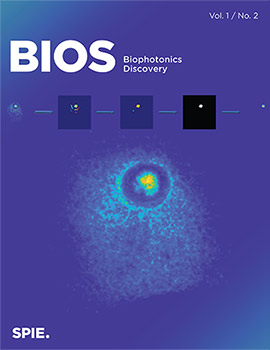Biophotonics Discovery
Editor-in-Chief: Darren Roblyer, Boston University, USA
Biophotonics Discovery (BIOS) addresses a gap in the current biophotonics publishing landscape. Many researchers in the biophotonics field are leveraging newly developed techniques to discover new biology and physiology, or to tackle important unmet clinical needs. This Gold Open Access journal will be the premier venue to highlight the realized promise of novel and emerging biophotonics technologies and their impacts on basic and clinical science and medicine. Read the press release and check out the calls for papers.
On the cover: The figure is from the article "Predictive model for laser-induced tissue necrosis with immunohistochemistry validation" by J. Junior Arroyo, Arunima Sharma, Jiaxin Zhang, and Muyinatu A. Lediju Bell.
Serve as a reviewer for BIOS
SPIE journals use a web-based peer-review system. Register yourself as a potential reviewer on our submission site https://bios.msubmit.net. If you have been an author or reviewer for an SPIE journal in the past, there should already be an account established for you in the system. If you have never been an author or reviewer for an SPIE journal, you will need to set up a new account. Please note that the reviewer database is shared between journals; if you already have a login for one SPIE journal, you do not need to create a separate account to become a reviewer for a different journal.
We thank you for taking the time and offering your talent to this critical aspect of technical publishing.
Responsibilities of Reviewers
The anonymous evaluation of a technical paper should follow some generally accepted professional guidelines, and it places the reviewer under certain obligations to the author and the journal.
Before accepting a review assignment, reviewers should disclose conflicts of interest resulting from direct competitive, collaborative, or other relationships with any of the authors, and avoid cases in which such conflicts preclude an objective evaluation. If you are unsure whether something constitutes a relevant interest, you should seek advice from the journal.
If you are unable to review a manuscript, you should decline the invitation promptly, and you are encouraged to provide suggestions of other potential reviewers who would be qualified to examine the manuscript.
SPIE Policies for Reviewers
Conference Proceedings
Reviewers should be aware that SPIE permits manuscripts based partly or entirely on scientific content previously reported in SPIE proceedings to be submitted to SPIE journals. For more information, please read our full policy on submission of conference proceedings papers to SPIE journals. Questions about this policy may be directed to the editorial office at journals@spie.org
Large Language Models
Because web-based large language models (LLMs), including ChatGPT, Bard, Bing AI, etc., log the prompts they are provided, most uses of these tools in peer review breach confidentiality, which is a violation of the peer review process. The following examples attempt to clarify acceptable and unacceptable uses of LLMs in the peer review process.
Prohibited uses include:
- Uploading the manuscript to a web-based LLM for any reason; and
- Uploading the reviewer’s comments, or any drafts or portions thereof, to a web-based LLM for any reason.
Acceptable uses may include:
- Asking the LLM to summarize the state of the art in a specific subject area to provide background for the reviewer.
- Enterprise or local versions of LLMs (not web-based) that do not save or store input prompts may be used for grammatical and stylistic assistance. Note that if an LLM is used in a review in any way, the reviewer must disclose its use to the Editor in the “Private Comments to Editor” box on the review form.
SPIE recognizes that LLMs are changing rapidly, along with acceptable uses, and will adapt this policy as needed in the future.
Resources for Reviewers
Reviewers are also encouraged to refer to the following resources:
SPIE Guidelines for Ethical Publishing
Reviewers, authors, and editors are expected to read and abide by these ethical publishing guidelines from SPIE.
COPE Ethical Guidelines for Peer Reviewers
This is a list of basic principles to which peer reviewers should adhere from the Committee on Publication Ethics (COPE), of which SPIE is a member.
Checklist for Editors, Reviewers, and Authors
This is a checklist to aid in the technical evaluation and preparation of journal papers. It guides reviewers and authors alike through a list of questions that will help them determine the novelty, significance, accuracy, and quality of a paper.
Reviewer Training Program
New and established peer reviewers can take this 3-hour training course, co-hosted by SPIE and Researcher.Life.
Editorials on Peer Review:
- "Four Attributes of an Excellent Peer Review," by Michael T. Eismann: This editorial by a past Optical Engineering editor-in-chief identifies four attributes that are essential to a high-quality peer review.
- "The editorial review process," by Chris Mack: This editorial by a former JM3 editor-in-chief outlines the review process, including responsibilities for authors, editors, and peer reviewers.
Peer reviewer training course
SPIE has partnered with e-learning platform Researcher.Life to offer a three-hour reviewer training course. This course is primarily aimed at graduate students and early career professionals, but established researchers may also benefit from the curriculum. This interactive course covers the nuts and bolts of how to referee a journal article, as well as guidelines for best practices and ethical responsibilities. Sign up for the course today!


